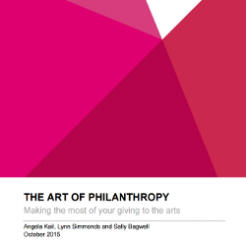Cuts to government arts funding and a London-centric philanthropy focus means that small arts charities are facing a “struggle to make their voices heard” according to a new report by New Philanthropy Capital.
The report, entitled The Art of Philanthropy, says that the arts sector is facing budget cuts of up to 40 per cent in this Parliament and that current philanthropic giving in the sector is focused primarily on big, London-based organisations.
It calls on the charity sector to develop structures to help funding for small arts charities outside the south east of England.
“The arts sector in England had an income of over £2.8bn in 2011/2012," the report says. "Just 38 arts organisations in England have an income of over £10m, which leaves more than 90 per cent of arts organisations with an income of less than £1m each.
“Around 40 per cent of the sector is made up of micro arts charities, with an income of less than £10,000.
“A large proportion of arts and cultural organisations are headquarter in the south east of England, in particular London, which is home to over a fifth of the total number of arts organisations. The organisations also share more than half of the total income for the arts in England.”
The report argues that while “private funding in the sector has grown over the last few years” this fact has masked “the huge discrepancies between regions, art forms and high and low-profile organisations. Large art charities with a strong brand are likely to grow the most, leaving small charities to weather the storm of future changes”.
NPC argues that the arts sector outside London “is the capital’s supply chain” and that there “needs to be a thriving arts sector outside London so that, overall, the UK arts sector is able to innovate and make an impact”.
NPC suggests that philanthropic investment in regional organisations can help those arts charities attract and keep new audiences digitally in an effort to compete with the “swift expansions in technology from the national charities”.
In the report, NPC suggest a number of initiatives to motivate philanthropists into funding the arts outside of London including a “network for philanthropists, or a giving circle that could help philanthropists find lesser-known organisations and give in a more structured way” and “initiatives that help arts organisations evidence their impact”.
Angela Kail, head of the funder team at NPC said: “We are about to enter a new phase for arts charities. They will be hit by more cuts in public spending, from big national names to small groups reliant on local authority cash, and even more will be expected from philanthropists as a result.
“Private donors have historically been very generous towards the arts, and they can meet the challenge again. But it will take careful and sometimes difficult decisions to ensure that its impact is maximised across the UK.”









